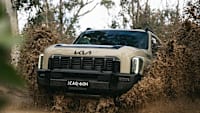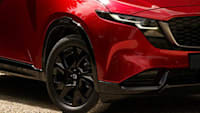Lexus now has a wider range of products in its line-up than it has ever had.
Ranging from the compact LBX crossover to the LX LandCruiser equivalent and LM ultra-luxury people mover, the Japanese luxury marque has an answer for almost every segment.
But does this equate to a lack of focus for the brand? And what (apart from its signature Encore ownership program) sets the brand apart?
-
Got an older Lexus? Here's why the brand has extended its ownership benefits to EVERY owner in Australia with new subscription program
-
2024 Lexus UX follows Toyota's lead by dropping petrol grades and becoming a hybrid and electric car as it ramps up battle against BMW X1 and Volvo XC40 SUVs
-
Lexus promises sedans and sports cars have a future in Australia despite its increasingly SUV-centric range. Bring on the electric Lexus IS and an EV LFA successor!
Speaking to CarsGuide at the launch of the LBX, Lexus Chief Executive, John Pappas, explained it was a few factors, but from a product perspective it is the reliability of Lexus products that set them apart for the brand’s loyal fans.
“It’s the quality craftsmanship and also the durability is a key compelling reason for the ‘why’ of the Lexus product,” he said.
Lexus had its biggest year on record in 2023, moving 15,192 units, but the brand says there are still 60,000 units on the road for its entire catalogue, stretching back to the first-generation Lexus LS of 1990. For those who know the history of the brand, the reasons for this may be obvious.
 copy.jpg)
Lexus is the luxury arm of Toyota, itself renowned for its reliability, and Lexus frequently ranks as the number one brand in the US-market JD Power reliability survey, the largest of its kind in the world. Lexus ranked ahead of the industry average 186 problems per 100 vehicles, with 113 average problems per 100 vehicles.
The Lexus RX specifically (based on the same underpinnings as the Toyota Kluger) ranked as the market’s most reliable SUV, with a score of 111, which bodes well for the brand as the large SUV has always been a best-seller in Australia.
Meanwhile, in Europe Lexus is a seven-time winner of the WhatCar? reliability survey from 2017 to 2023, which not only includes the numbers of issues reported, but also how long brands take to get them fixed, which should also ring true in Australia where the familiar Toyota parts network is renowned for being the farthest-reaching.
 copy.jpg)
It’s worth noting, however, that Lexus doesn’t quite have the same performance lineage as some of its luxury rivals, which often calls for more highly-strung turbocharged engines that are naturally less reliable than the less stressed (Atkinson-cycle) units which appear particularly in the Japanese marque’s hybrid line-up.
It has also been able to continue to market drivetrain technology that does not comply with the stringent Euro-6 and onward emissions regime as its largest market is North America rather than Europe.
Off the back of its growing fanbase, expanding range of vehicles, and popular plugless hybrid variants, Lexus says it is settling into a 10,000-unit per year ‘baseline’ for sales, noting some 60.4 per cent of its sales in Australia are ‘electrified’ (consisting of plugless hybrid, plug-in hybrid, and fully electric).
The next move for Lexus will be to push more deeply into the off-road segment with the arrival of the Toyota-Prado-based GX for the first time.
It is a departure for the brand, both in terms of its off-road focus, but also its squared-off and more aggressive styling.
While it will bring more new buyers to the brand, Pappas expects there to be many existing Lexus buyers wanting to upgrade into a vehicle with a third row, just one that isn’t as big or as expensive as the LX or LM respectively.








.jpg)







.jpg)



.jpg)
.jpg)
 copy.jpg)
 copy.jpg)
 copy.jpg)
 copy.jpg)
.jpg)
.jpg)
.jpg)


.jpg)

.jpg)